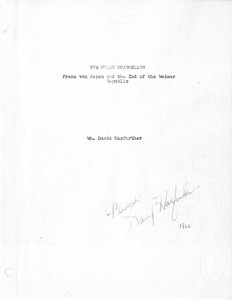| dc.rights.license | In Copyright | en_US |
| dc.creator | Hasfurther, William David | |
| dc.date.accessioned | 2023-10-20T18:01:58Z | |
| dc.date.available | 2023-10-20T18:01:58Z | |
| dc.date.created | 1966 | |
| dc.identifier | WLURG038_Hasfurther_thesis_1966 | |
| dc.identifier.uri | https://dspace.wlu.edu/handle/11021/36562 | |
| dc.description.abstract | What is the verdict n von Papen? History has yet to pronounce it, but historians of the past generation have not judged his case sympathetically. Todcy and for some time to come students who examine it will ask, above all, whether von Hindenburg 's Franzschen foresaw the domination of Germany by t e Nazis -- a prospect brought the closer to r ealization by the embittered exchancellor's easing Hitler into the government. This, apparently, he did not. Von Papen wa surely no believer in the parliamentay, democratic regime, but neither did he relish the totalitarianism of the Nazis (which he publicly condemned, at the risk of his life, as it developed, shortly before the "Blood Purge " of June, 1934). He was a monarchist who looked less to the modern "popular monarchy" of Britain and Scandinavia than to an order of government and society belonging to the time before that event which European conservatives used to consider the ruin of sound public principles -- the French Revolution.[1] Von Papen anticipated the possible development of two types of government that would lead to the growth of despotic administrative systems. He saw both of these trends in the democratic governments of his time; and he expected them to merge in a later government, which might, indeed , still continue under the name of a democracy. The first of these regimes would deify the state and so would come to gain complete mastery over the individual. Such a system was offered by the Nazis. The second was the state of social services, in which the state controlled the individual purportedly for his own good. This was the society offered by Bolshevism.[2] But von Papen felt that a third kind of state shoulcl be sought. This state had nothing to do with a parliamentanry or representative system. Here the central government wonld be reduced in its functions to the minimum. Power would be left to a group of independent intermediate bodies, to the people t hat were directly concerned with given problems at issue. This regime was not militaristic, nor was it expansionistic. But it would demand full political equality of r ghts for Germany -- rights which would help to affirm Germany's place among the Christian society of European states. [3] [From Afterword] | en_US |
| dc.format.extent | 176 pages | en_US |
| dc.language.iso | en_US | en_US |
| dc.rights | This material is made available for use in research, teaching, and private study, pursuant to U.S. Copyright law. The user assumes full responsibility for any use of the materials, including but not limited to, infringement of copyright and publication rights of reproduced materials. Any materials used should be fully credited with the source. | en_US |
| dc.rights.uri | http://rightsstatements.org/vocab/InC/1.0/ | en_US |
| dc.title | The Uhlan Chancellor, Franz von Papen and the End of the Weimar Republic | en_US |
| dc.type | Text | en_US |
| dcterms.isPartOf | WLURG038 - Student Papers | en_US |
| dc.rights.holder | Hasfurther, William David | en_US |
| dc.subject.fast | Papen, Franz von, 1879-1969 | en_US |
| dc.subject.fast | Politics and government | en_US |
| dc.subject.fast | Germany | en_US |
